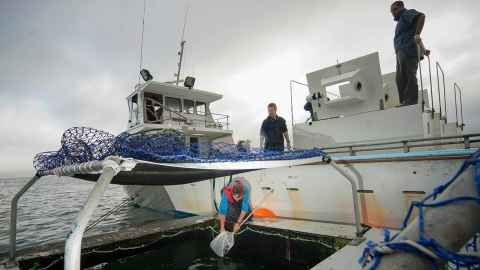Aquaculture research
Our extensive research covers the breadth of aquaculture, from production to end-product processing.

Aquaculture is a key part of New Zealand’s economic wealth. In the past 50 years, aquaculture in New Zealand has grown from small beginnings to a significant primary industry, sustainably producing the world’s best seafood – Greenshell Mussels, King Salmon and Pacific Oysters. New Zealand’s aquaculture sector generates over $650 million in revenue, employs over 3000 Kiwis, and has an ambitious target of becoming a $3 billion-a-year industry by 2035. Optimising the sustainable production of seafood in aquaculture is a key part of what marine staff at the UoA and within the NIWA JGS do and their research will play a major role in helping the government reach its ambitious target.
Researchers work hand-in-hand with industry to solve production problems so that the highest quality seafood products can be grown on a sustainable basis, either within land-based grow out systems (RAS) or within the clean inshore and offshore waters of New Zealand. The key culture species might be mussels, salmon and oysters but the potential for new candidate species (e.g. octopus) is always being explored too.
Research topics
- Understanding the biology of new and existing aquaculture species for optimised husbandry, nutrition, production and feed efficiency in aquaculture systems.
- Developing new hatchery techniques that guarantee the supply of high-performing larvae or seed.
- Optimisation of rearing in recirculating aquaculture systems (RAS).
- Understanding how to optimise the production of fish and shellfish in offshore environments.
- The development of novel fish swimming technology for enhanced productivity, quality and welfare.
Our researchers
University staff
Dr Brendon Dunphy
Dr Neill Herbert
Professor Andrew Jeffs
Associate Professor Craig Radford
NIWA Contact
Alvin Satiawan